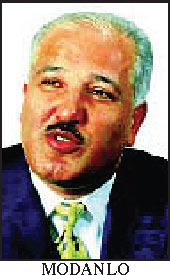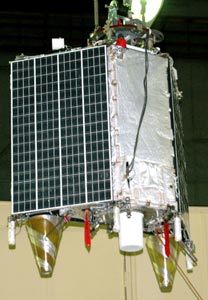December 27-2013

. . . 8 years in prison
A federal judge in Maryland Friday sentenced Iranian-American Nader Modanlo to eight years in prison, believed to be the highest sentence meted out to anyone for violating the US sanctions on Iran.
Modanlo, 53, was convicted in June of several crimes for helping Iran arrange for a satellite—Iran’s first satellite—to be lofted into orbit by Russia in 2005.
The federal government said Modanlo took $10 million from the Iranian government for his help and went through major contortions to hide the fact that the money was Iranian. Modanlo wanted the funds to try to keep his faltering satellite business in the United States afloat.
But Modanlo didn’t ship any armaments to Iran, as is the case in most of the sanctions violations prosecuted by the United States. Yet, his sentence was greater than those who sell weapons or nuclear gear to Iran usually are given.
The Iran Times pulled nine cases over the last three years from its archives and found that the average sentence for violating the sanctions law has been 39 months, just 40 percent the 96 months given to Modanlo.

. . . still in orbit
The sentences in the nine cases plucked from the archives ranged from a suspended sentence for an Indian-American who tried to ship digital microwave radios to Iran to 92 months—almost as much as Modanlo’s sentence—for an American, Richard Phillips, who tried to send Iran a complete F-5 fighter jet.
US District Judge Peter J. Messitte did not explain his rationale for the heavy sentence. In addition to the eight-year prison term, he ordered Modanlo to forfeit the entire $10 million he was paid by the Islamic Republic.
In filings with the judge, the prosecution had asked that Modanlo lo be sentenced to 16 to 20 years. The defense argued he should spend no more than 27 months behind bars, pointing out that the satellite program Modanlo’s stood accused of aiding was non-military.
“The government has produced absolutely no evidence that Mr. Modanlo had any dealings with any member of the Iranian military or that the satellite technology at issue here was or could be used for any military purpose, “ defense attorney James McGuire wrote the judge.
The satellite in question, Sina-1, was both built and launched by Russia for Iran. It is still in orbit.
Modanlo had once worked for the National Aeronautics and Space Agency (NASA) on satellite projects but then went into business for himself.
A jury of 11 women and one man took more than a week to find Modanlo guilty of violating the US embargo on business transactions with Iran, money laundering (referring to his efforts to hide the origins of the $10 million he received) and obstruction of justice (for lying during a bankruptcy proceeding).
At the trial, defense attorney Lucius Outlaw said the government’s case was built purely on fears of Iran. The $10 million, they said, was a legitimate loan for Modanlo’s satellite business.
The international elements of the case presented challenges for the government. There were no witnesses from Russia or Iran to testify. Some documents had to be secured from Russia and Switzerland. The $10 million was paid from Iran to a Swiss bank account and then from that account to Modanlo’s own account in the United States.
In an interview with The Washington Post after the trial ended, the foreperson of the jury said, “There was no doubt in anyone’s mind that these acts were committed. It was a question of what the government had to prove.”
The foreperson said, “There were very heated debates [in the jury room] because there was no direct testimony—everything was on paper.”
“The documents put Modanlo in the middle of brokering a deal,” Assistant US Attorney David Salem said during closing arguments in the trial that lasted more than five weeks. “Everything he does is designed to conceal and hide.”
Modanlo’s defense team said the money was a legitimate loan from international businessmen.
The defense team said the governments of Russia and Iran did not need a middleman to make a deal. “Why would Iran pay Nader Modanlo $10 million when they could have gone directly to Russia?” Outlaw asked jurors.
Modanlo was accused of arranging meetings between Iranian government officials and representatives of the Russian aerospace company Polyot. Modanlo had been working for years with Polyot to launch small satellites being built by his own private business. He had permission from the US government to do business with Polyot.
“The government is counting on your fear [of Iran] clouding your judgment,” Outlaw said.
Born in Iran, Modanlo came to the United States to study engineering and science at George Washington University from 1979 to 1987. He worked for NASA before starting his own company in 1992 and settling in Potomac, Maryland, a wealthy suburb of Washington, DC.
Modanlo had hoped to establish a constellation of low earth orbit (LEO) satellites to provide services to customers—for example, tracking systems so truck firms would always know exactly where all their trucks were. But he ran into financial problems and needed money to keep the firm afloat.
Five Iranians living in Iran were also charged in the case, but the United States has been unable to arrest any of them.
Over five years—from January 2007 to February 2013—the US Justice Department filed 79 cases for violations of the embargo on Iran. That is an average of just over one per month.
A total of 145 people were charged with running smuggling operations and other sanctions violations with barely half, 53 percent, being Iranians or Iranian-Americans.
Another 19 percent of those charged were American, while the remaining 28 percent came from 18 different countries including one Brazilian, three Belgians and five Irishmen.



















